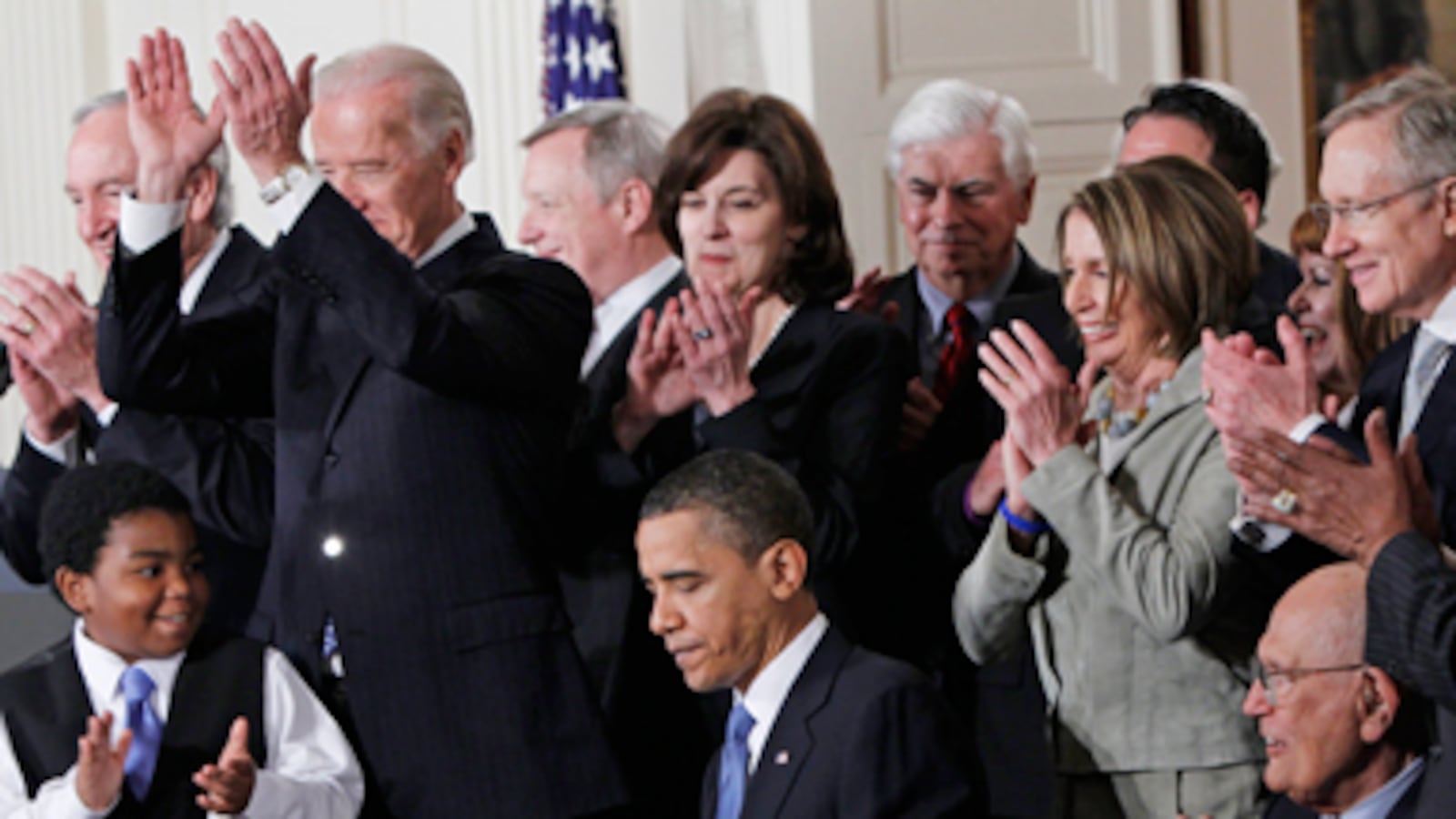Defund! Repeal! It’s unconstitutional! The vitriolic attacks from the Tea Party, RepealItNow.org, and certain members of Congress are designed to keep people from understanding what “ Obamacare” really means.

Fewer denials for preexisting conditions. Prescription drug costs reduced for seniors. A million more young adults have health insurance. Tax credits for small businesses.
Vice President Biden captured the moment perfectly, if a bit crudely, when he said of President Obama signing the Patient Protection and Affordable Care Act one year ago: “ Mr. President, this is a big [expletive] deal”.
And it was.
Republicans know that the longer the popular “Big [Expletive] Deal” parts of health care get integrated into the health-care market, the harder it will be to jettison them.
Think about it. Six months ago some “Big [Expletive] Deal” consumer protections took effect—protections that people really like:
1. Children with preexisting conditions can no longer be denied coverage.
2. Health plans cannot rescind your policy if you get “too” sick.
3. No more lifetime or annual caps on your benefits.
4. Preventive screenings, such as annual physicals, well-baby visits, and mammograms provided free of charge.
5. And parents like me can keep our children on our policy until they turn 26.
(Note: the government also sent $250 checks to seniors as a down payment toward closing the Medicare prescription drug “doughnut hole.”)
It’s important to remember that those yelling about defunding or repealing are noticeably silent about these provisions and the millions who are benefiting. Sure, the Republicans released their “Pledge to America”—coincidentally, on the same day the Affordable Care Act’s most popular changes took effect—the Pledge carefully avoided discussing, much less proposing, repealing those extremely positive consumer provisions, save for a carefully worded and diminished preexisting condition.
Even before we got into the business of helping people, we had to follow a long, winding, torturous, high-drama legislative tightrope filled with too much hyperbolic rhetoric.
Republicans and their supporters focused their considerable anger on the horrors of a wholesale government takeover of health care and the ultimate in fear mongering, “ death panels”. Senate Minority Leader Mitch McConnell called the law’s passage “an act of total arrogance.”
And Democrats were not immune from such hyperbole. Senate Majority Leader Harry Reid, equated the Republicans’ “slow down, stop everything, and start over” strategy to those who “belatedly recognized the wrongs of slavery” and opposed civil rights and women’s suffrage. Such an overheated debate left little room for compromise.
Not until I served on Obama’s Fiscal Commission did I truly appreciate how deep-seated the Republicans’ anger was. Time seemed only to harden the resolve of those opposed to the health-care law. And they had one goal in mind: Do whatever it takes to frustrate the law’s implementation while doing everything possible to repeal it.
The truth is that Republicans know that the longer the popular “Big [Expletive] Deal” parts of health care get integrated into the health-care market, the harder it will be to jettison them. Additionally, the first set of possible bipartisan changes—eliminating small employers’ need to file 1099 forms and allowing states to opt out of some of the law’s national requirements—shows that the law is not set in stone. Rather, as we learned under Mitt Romney’s Massachusetts plan, major reform of health-care legislation is nothing more than a framework that needs constant review and modification as political policy meets health-care delivery.
I’m confident that the Affordable Care Act will withstand efforts to subject it to a death of 1,000 cuts. And history will remember it as the first step forward—that is, until we get to the next health-care fork in the road. This will involve an even more inflammatory discussion: Does America follow the roadmap of Wisconsin Rep. Paul Ryan and provide capped health care vouchers, or Wisconsin Gov. Scott Walker’s plan of forcing public employees to pay for increased costs? Or does America learn the lesson of our competitors who have built national systems, both public- and private sector-based, that pay on average 5 to 7 percent less of GDP than what health care costs our economy?
Under any scenario, increasing medical costs coupled with aging demographics, mean America is not done with the health-care debate. But it is time to move forward while remembering that what we did do is a “Big [Expletive] Deal.”
Andy Stern is a senior fellow at the Georgetown Public Policy Institute and a former president of the Service International Employees Union.






